- Home
- Technical Cooperation Projects
- Index of Countries
- Asia
- Mongolia
- Project for Promoting Employment of Persons with Disabilities (DPUB2)
- Project News
- Promoting Job Coach System linking persons with disabilities and companies to Mongolia. <first>
Project news
2023-07-05
Promoting Job Coach System linking persons with disabilities and companies to Mongolia. <first>
Learning from the active initiatives of Japanese community-based support organisations and government authorities
Eighteen Mongolian training participants and carers visited Osaka in mid-February when a cold light rain fell. Diverse actors took part in the training; Some were government officials involved in promoting employment of persons with disabilities, including the Ministry of Labour and Social Protection (MLSP), which administers policy in the social welfare sector in Mongolia, the General Authority for the Development of Persons with Disabilities, the General Authority for Labour and Welfare Services and the Department of Labour and Social Welfare, Ulaanbaatar City Council. Others are civil servants, human resources staff of companies and members of persons with disabilities organisations. The training participants visited Japan as part of the technical cooperation “Project for Promoting Employment of Persons with Disabilities (DPUB2)” to visit the workplaces of persons with disabilities in Japan and learn about the initiatives and roles of support organisations and how job coaches are working.
Extensive support from assessment to follow-up
“Assessment of both a person with disabilities and a company is important to avoid mismatches.” “Job coaches should not stand out, considering the workplace after they leave.” “It is crucial to pay attention to any signs of a run-down, even when the condition is stable.” The training participants listened intently to the concise explanations. Some nodded their heads while others took notes diligently as watching the slides. The conference room of the social welfare organisation Kashima Yuaikai in Yodogawa Ward, north-west Osaka, was full of exuberance and enthusiasm, in contrast to the grey sky outside the window.
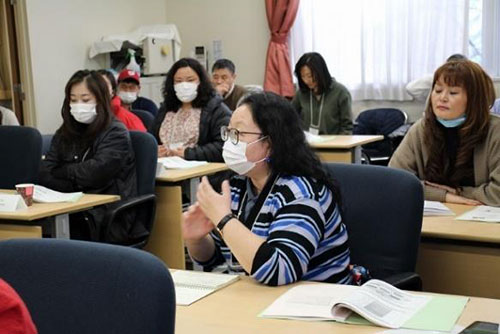 Trainees eagerly asking questions
Trainees eagerly asking questions
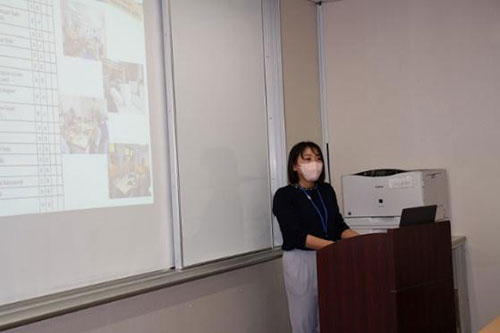 Staff member Ms Yui Mizutsu explained the role of Link and the activities of the job coaches
Staff member Ms Yui Mizutsu explained the role of Link and the activities of the job coaches
Kashima Yuaikai has been operating social welfare services for persons with disabilities and senior citizens for 30 years, aiming to provide and enhance welfare closely linked to the Kashima and Mitsuya areas of Yodogawa Ward. With regard to disability welfare, the Kashima Centre for Persons with Disabilities Link (hereafter “Link”) was established within Kashima Yuaikai in 2006 to enable as many persons with disabilities to work and obtain society’s approval. Link’s employment support workers assess persons with disabilities and then provide them with opportunities for work in the facilities and work experience training, enabling them to establish the working and living practices and improve their social life skills necessary for working life, such as getting used to standing work, prohibiting private conversation during work, and using respectful language with superiors. In addition, together with workplace adaptation assistants from the Employment Support Division for Persons with Disabilities, so-called job coaches, they explore workplaces and conduct assessments for job matching. After finding employment, they visit workplaces and follow up as necessary, providing generous support for long-term employment. More than 200 users have achieved employment so far.
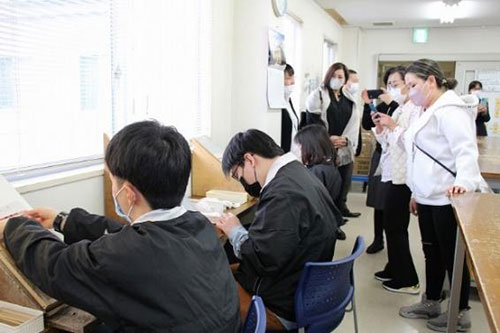 Training participants observed with interest facility users engaged in various tasks in preparation for their employment.
Training participants observed with interest facility users engaged in various tasks in preparation for their employment.
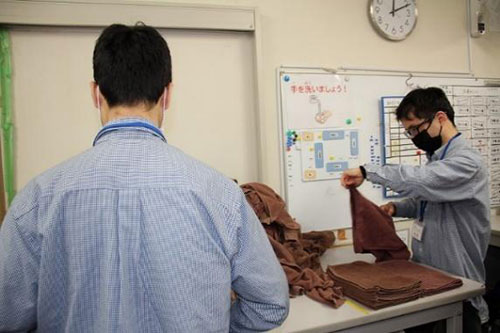 Users were working on the four-folding of towels, a common task in hotel and hospital work
Users were working on the four-folding of towels, a common task in hotel and hospital work
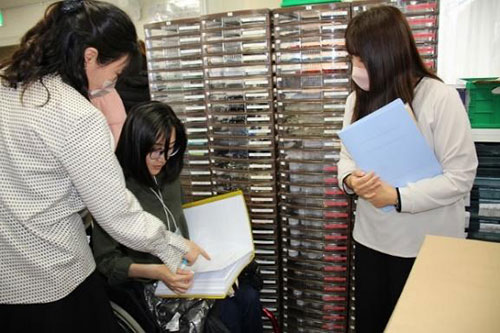 Training participants (centre) and Ms Yumiko Tamashiro (right), Director of Link’s Support Division, looking at a manual for sorting documents in front of a letter case, a typical office setting
Training participants (centre) and Ms Yumiko Tamashiro (right), Director of Link’s Support Division, looking at a manual for sorting documents in front of a letter case, a typical office setting
 Manuals on sorting documents are divided into difficulty levels.
Manuals on sorting documents are divided into difficulty levels.
After receiving an explanation of Link’s activities from staff member Ms Yui Mizutsu, the participants were divided into two groups. Ms Yumiko Tamashiro, Director of Link’s Support Division, and Ms Mizutsu guided the participants on a facility tour. They watched users seriously practising the training of measuring a certain amount of liquid and transferring it to a bottle. They also looked at the letter case and sorting manual, classified according to type, with slips, documents, magnets and card rings, simulating a typical office workplace. In the next room, they observed the process of folding towels into four layers by aligning the corners. Everyone nodded as Ms Tamaki explained that they are given practical training because they are likely to work in such work, especially in hotels and hospitals.
User stories that the training participants applauded
During the three-day training in Osaka, the participants learned about governmental systems to support the employment of persons with disabilities from officials of the Osaka City Vocational Rehabilitation Centre and the Osaka Vocational Center for Persons with Disabilities. Furthermore, they spent a rich time visiting the Heartfull Office in the Osaka Prefectural Government and Hello Work to observe the employment sites of both the government and private companies.
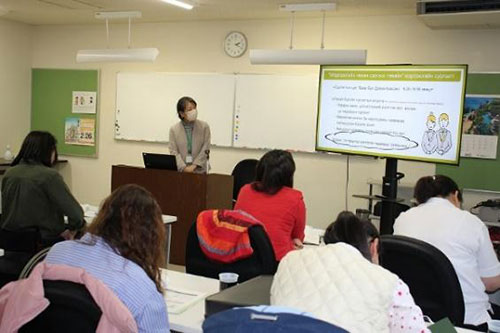 Director Ms Kyoko Sakai explained the role and work of the Osaka City Vocational Rehabilitation Centre.
Director Ms Kyoko Sakai explained the role and work of the Osaka City Vocational Rehabilitation Centre.
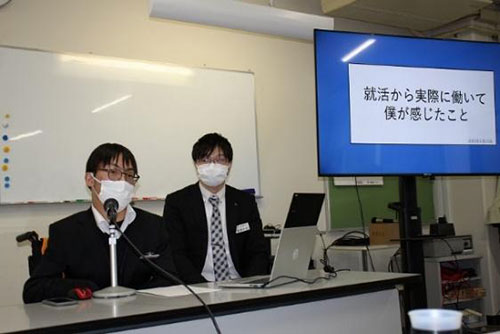 Mr Kenta Kojima (left), who received training at the Osaka City Vocational Rehabilitation Centre and then started working at Kinki Doro Co, Ltd, shared his experiences with his supervisor.
Mr Kenta Kojima (left), who received training at the Osaka City Vocational Rehabilitation Centre and then started working at Kinki Doro Co, Ltd, shared his experiences with his supervisor.
Established in April 1985, the Osaka City Vocational Rehabilitation Centre provides vocational training to assist persons with physical, intellectual, mental and developmental disabilities in getting and keeping a job. Center director Ms Kyoko Sakai explained that the centre offers a one-year course and a short-term course of one to four months, providing computer work and occupational training and guidance on communication skills and assistance in acquiring qualifications. About 1,600 people have graduated from the centre, and 55 still undergo training there.
Following the presentation, Kenta Kojima, a wheelchair user who joined Kinki Doro Co, Ltd. in April 2021 after undergoing vocational training at the centre, spoke on stage with his supervisor. He shared his experiences during his job hunting, the tasks he is currently in charge of at the company, and how he feels while working there. The training participants listened to his frank talk with great interest and often applauded.
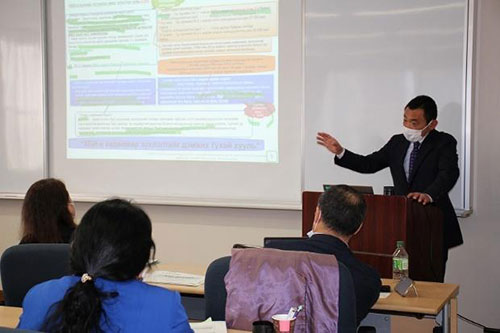 The Osaka Vocational Center for Persons with Disabilities, a sub-organisation of the Japan Organization for Employment of the Elderly, Persons with Disabilities and Job Seekers, also gave a presentation.
The Osaka Vocational Center for Persons with Disabilities, a sub-organisation of the Japan Organization for Employment of the Elderly, Persons with Disabilities and Job Seekers, also gave a presentation.
The Vocational Centre is a subsidiary of the Japan Organisation for Employment of the Elderly, Persons with Disabilities and Job Seekers (hereafter “JEED”) under the Ministry of Health, Labour and Welfare. Osaka Vocational Center for Persons with Disabilities is one of the 47 prefectures and five branch offices of the Local Vocational Centres for Persons with Disabilities and provides comprehensive support to senior citizens, persons with disabilities, job seekers and employers. Each centre has a vocational counsellor and provides community-based vocational rehabilitation services in close cooperation with Hello Work, Employment and Living Support Centres for Persons with Disabilities and relevant medical, educational and welfare institutions. Mr Shintaro Seike, Chief Counsellor at the Osaka Vocational Centre for Persons with Disabilities, explained the centre’s work, particularly the support system provided by job coaches. He presented that “job coach support is provided by multiple job coaches, considering the rotation and their psychological stress. Ms Mahiro Niwa from the JEED Osaka Branch described the flow of JEED’s support for employers and the grant system.
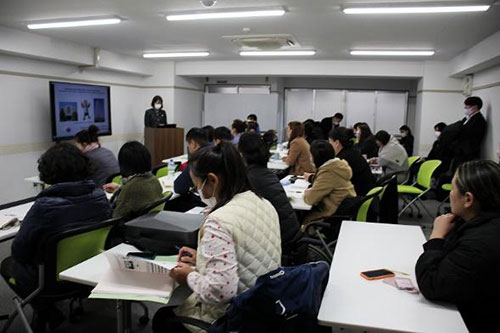 Ms Yukari Sugimori, Assistant Director of the Independence Support Section, Disability Welfare Office, Welfare Department, Osaka Prefectural Government, explained efforts to employ persons with disabilities in Osaka Prefecture.
Ms Yukari Sugimori, Assistant Director of the Independence Support Section, Disability Welfare Office, Welfare Department, Osaka Prefectural Government, explained efforts to employ persons with disabilities in Osaka Prefecture.
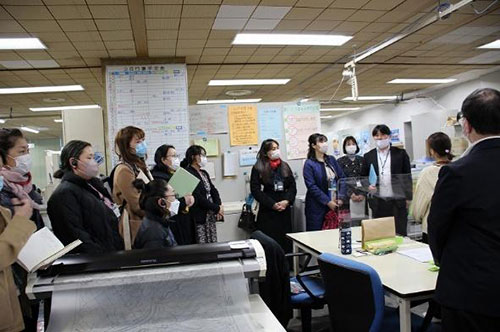 Training participants touring the Heartful Office on the ground floor of the Osaka Prefectural Government.
Training participants touring the Heartful Office on the ground floor of the Osaka Prefectural Government.
Ms Yukari Sugimori, Assistant Director of the Independence Support Section, Disability Welfare Office, Welfare Department, Osaka Prefectural Government, gave an overview of the number of persons with disabilities certificates in Osaka Prefecture and the types of disability, before introducing the number of offices and users of employment-related welfare services and initiatives to support persons with disabilities in employment. It was also noted that Osaka Prefecture maintains one of the highest levels of employment of persons with disabilities in the country under the Governor’s initiative. She also introduced the Osaka Prefecture Heartful Office Promotion Project, which employs persons with disabilities as part-time employees at prefectural government and enables them to find employment at general companies through their experience. The tour also included a guided tour of the Heartful Office on the first floor of the prefectural government and the Welfare Convenience Store Kosatetan, which sells sundries and baked goods made at welfare facilities for persons with disabilities.
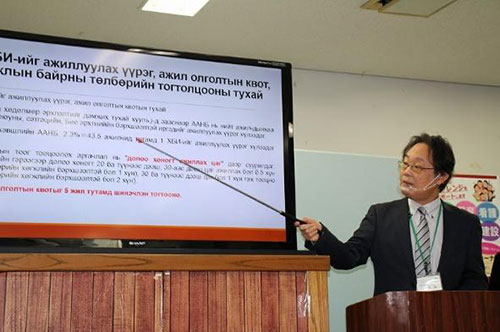 Mr Nobuaki Iyo, Special Assistance Division 1, explained the functions and roles of Hello Work.
Mr Nobuaki Iyo, Special Assistance Division 1, explained the functions and roles of Hello Work.
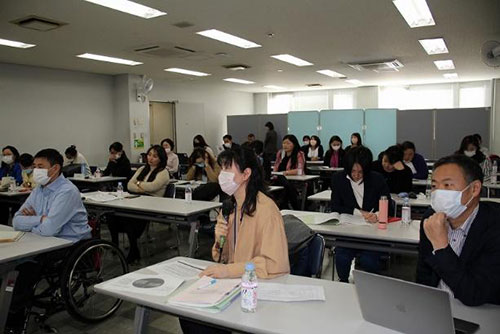 Training participants listened attentively to Mr Iyo’s explanation.
Training participants listened attentively to Mr Iyo’s explanation.
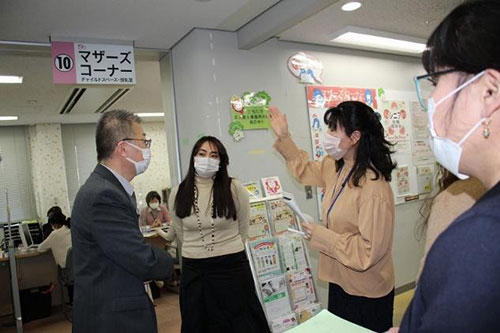 Training participants were briefed on the Mothers’ Corner, which supports women raising children.
Training participants were briefed on the Mothers’ Corner, which supports women raising children.
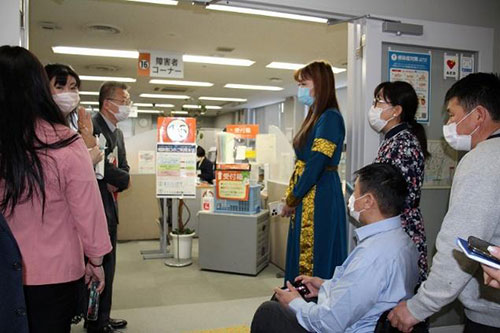 An enthusiastic Q&A session continued in the person with disabilities section.
An enthusiastic Q&A session continued in the person with disabilities section.
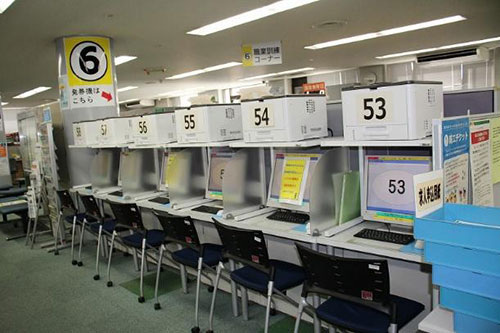 Computers are well-equipped to view job vacancies.
Computers are well-equipped to view job vacancies.
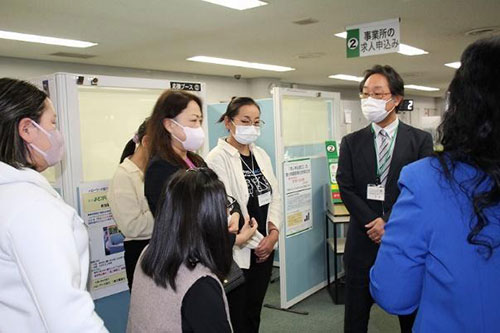 While touring Hello Work Yodogawa, the training participants learnt about the function of Hello Work, which connects employers and job seekers.
While touring Hello Work Yodogawa, the training participants learnt about the function of Hello Work, which connects employers and job seekers.
The participants also visited Hello Work Yodogawa to learn more about the Hello Work (public employment security office) scheme, which is run by the state to provide a range of services free of charge to jobseekers and businesses. Mr Nobuaki Iyo, Supervising Vocational Guidance Officer, Specialist Assistance Division 1, gave an overview of the role and functions of Hello Work. He stated that in recent years, the number of persons with mental and developmental disabilities has increased rapidly in registration. Furthermore, he emphasized that in order to further promote the employment of persons with disabilities and ensure their integration, it is essential to collaborate not only with Hello Work (public employment service), but also with relevant organizations as social resources and work together as a team. He passionately stated, “It is the role of Hello Work to coordinate and facilitate the participation of individuals in various social resources and guide their actions”. The training participants were then divided into three groups for a tour of Hello Work, where they looked around with great interest at the job training application corner, which was crowded with job seekers, and the Mothers’ Corner, which was set up for mothers raising children.
- About JICA
- News & Features
- Countries & Regions
- Our Work
- Thematic Issues
- Types of Assistance
- Partnerships with Other Development Partners
- Climate Change / Environmental and Social Considerations
- Evaluations
- Compliance and Anti-corruption
- Science and Technology Cooperation on Global Issues
- Research
- JICA Development Studies Program / JICA Chair
- Support for the Acceptance of Foreign HRs / Multicultural and Inclusive Community
- Publications
- Investor Relations
